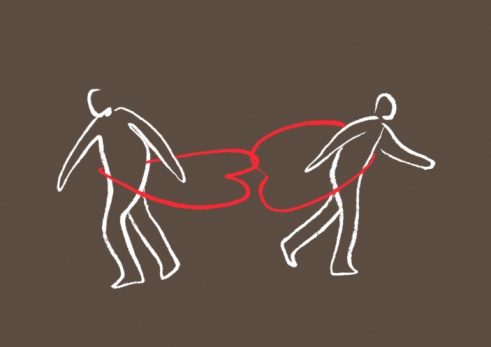 If you are facing the possibility of a divorce, choosing a divorce lawyer could be one of the most important decisions in your life. Divorce is unfair. It forces you to make some of the most difficult decisions in your life at a time when you might be least able to do so. Having someone you trust to advise you is important.
There are hundreds of lawyers in the Twin Cities with significant experience handling divorce cases. Regardless of what you may think of lawyers (and surveys would suggest that may not be overly positive) lawyers are, for the most part, like the rest of our society. They come in all shapes and sizes, and have varying degrees of skill, honesty and effectiveness. If you work hard and do your homework, you can find one of the really good ones. Perhaps more importantly, you want to the best attorney for you. The key is to know how to investigate and interview so that you find the right fit.
Investigating Lawyers to Interview.
The first step is to find attorneys to interview. The best way to start is to talk with people you know who have had a positive experience with their divorce attorney and find out what it is about their attorney that they liked. The other option is to research the internet carefully, at least to make sure you understand all of the process options available. While it would be reckless to choose an attorney from online information alone, the internet can be an effective way to find someone to interview. It is also a good way to learn about the main process choices that exist in our community; namely traditional representation; mediation and Collaborative Practice.
Once you have found an attorney to interview (or ideally several attorneys), you should contact each attorney (by phone or email) and find out if they charge for the initial consultation. Many family law attorneys will provide consultations for free, or at little charge, in order to give you the opportunity to meet them and learn how they work.
When you do interview the attorneys, do not be afraid to ask them difficult questions to help you determine if they are a good fit for you. Many books include guidance on questions to ask your attorney including, The Collaborative Way to Divorce.
Make sure that each attorney that you interview provides a description of the main process choices described above and make sure they describe their experience and training in each of these areas. Attorneys, like most people, have preferences and biases and their description of the three basic options can be filtered by their own preferences, rather than being based upon actual experience. If, for example, your attorney has not had significant experience in mediation or Collaborative Law, their recommendation may be based on third hand accounts of information or bias, rather than actual expertise. To find attorneys who have experience or expertise in Collaborative Law and mediation, go to www.collaborativelaw.org or www.divorcechoice.com.
If you are facing the possibility of a divorce, choosing a divorce lawyer could be one of the most important decisions in your life. Divorce is unfair. It forces you to make some of the most difficult decisions in your life at a time when you might be least able to do so. Having someone you trust to advise you is important.
There are hundreds of lawyers in the Twin Cities with significant experience handling divorce cases. Regardless of what you may think of lawyers (and surveys would suggest that may not be overly positive) lawyers are, for the most part, like the rest of our society. They come in all shapes and sizes, and have varying degrees of skill, honesty and effectiveness. If you work hard and do your homework, you can find one of the really good ones. Perhaps more importantly, you want to the best attorney for you. The key is to know how to investigate and interview so that you find the right fit.
Investigating Lawyers to Interview.
The first step is to find attorneys to interview. The best way to start is to talk with people you know who have had a positive experience with their divorce attorney and find out what it is about their attorney that they liked. The other option is to research the internet carefully, at least to make sure you understand all of the process options available. While it would be reckless to choose an attorney from online information alone, the internet can be an effective way to find someone to interview. It is also a good way to learn about the main process choices that exist in our community; namely traditional representation; mediation and Collaborative Practice.
Once you have found an attorney to interview (or ideally several attorneys), you should contact each attorney (by phone or email) and find out if they charge for the initial consultation. Many family law attorneys will provide consultations for free, or at little charge, in order to give you the opportunity to meet them and learn how they work.
When you do interview the attorneys, do not be afraid to ask them difficult questions to help you determine if they are a good fit for you. Many books include guidance on questions to ask your attorney including, The Collaborative Way to Divorce.
Make sure that each attorney that you interview provides a description of the main process choices described above and make sure they describe their experience and training in each of these areas. Attorneys, like most people, have preferences and biases and their description of the three basic options can be filtered by their own preferences, rather than being based upon actual experience. If, for example, your attorney has not had significant experience in mediation or Collaborative Law, their recommendation may be based on third hand accounts of information or bias, rather than actual expertise. To find attorneys who have experience or expertise in Collaborative Law and mediation, go to www.collaborativelaw.org or www.divorcechoice.com.  If you are facing the possibility of a divorce, choosing a divorce lawyer could be one of the most important decisions in your life. Divorce is unfair. It forces you to make some of the most difficult decisions in your life at a time when you might be least able to do so. Having someone you trust to advise you is important.
There are hundreds of lawyers in the Twin Cities with significant experience handling divorce cases. Regardless of what you may think of lawyers (and surveys would suggest that may not be overly positive) lawyers are, for the most part, like the rest of our society. They come in all shapes and sizes, and have varying degrees of skill, honesty and effectiveness. If you work hard and do your homework, you can find one of the really good ones. Perhaps more importantly, you want to the best attorney for you. The key is to know how to investigate and interview so that you find the right fit.
Investigating Lawyers to Interview.
The first step is to find attorneys to interview. The best way to start is to talk with people you know who have had a positive experience with their divorce attorney and find out what it is about their attorney that they liked. The other option is to research the internet carefully, at least to make sure you understand all of the process options available. While it would be reckless to choose an attorney from online information alone, the internet can be an effective way to find someone to interview. It is also a good way to learn about the main process choices that exist in our community; namely traditional representation; mediation and Collaborative Practice.
Once you have found an attorney to interview (or ideally several attorneys), you should contact each attorney (by phone or email) and find out if they charge for the initial consultation. Many family law attorneys will provide consultations for free, or at little charge, in order to give you the opportunity to meet them and learn how they work.
When you do interview the attorneys, do not be afraid to ask them difficult questions to help you determine if they are a good fit for you. Many books include guidance on questions to ask your attorney including, The Collaborative Way to Divorce.
Make sure that each attorney that you interview provides a description of the main process choices described above and make sure they describe their experience and training in each of these areas. Attorneys, like most people, have preferences and biases and their description of the three basic options can be filtered by their own preferences, rather than being based upon actual experience. If, for example, your attorney has not had significant experience in mediation or Collaborative Law, their recommendation may be based on third hand accounts of information or bias, rather than actual expertise. To find attorneys who have experience or expertise in Collaborative Law and mediation, go to www.collaborativelaw.org or www.divorcechoice.com.
If you are facing the possibility of a divorce, choosing a divorce lawyer could be one of the most important decisions in your life. Divorce is unfair. It forces you to make some of the most difficult decisions in your life at a time when you might be least able to do so. Having someone you trust to advise you is important.
There are hundreds of lawyers in the Twin Cities with significant experience handling divorce cases. Regardless of what you may think of lawyers (and surveys would suggest that may not be overly positive) lawyers are, for the most part, like the rest of our society. They come in all shapes and sizes, and have varying degrees of skill, honesty and effectiveness. If you work hard and do your homework, you can find one of the really good ones. Perhaps more importantly, you want to the best attorney for you. The key is to know how to investigate and interview so that you find the right fit.
Investigating Lawyers to Interview.
The first step is to find attorneys to interview. The best way to start is to talk with people you know who have had a positive experience with their divorce attorney and find out what it is about their attorney that they liked. The other option is to research the internet carefully, at least to make sure you understand all of the process options available. While it would be reckless to choose an attorney from online information alone, the internet can be an effective way to find someone to interview. It is also a good way to learn about the main process choices that exist in our community; namely traditional representation; mediation and Collaborative Practice.
Once you have found an attorney to interview (or ideally several attorneys), you should contact each attorney (by phone or email) and find out if they charge for the initial consultation. Many family law attorneys will provide consultations for free, or at little charge, in order to give you the opportunity to meet them and learn how they work.
When you do interview the attorneys, do not be afraid to ask them difficult questions to help you determine if they are a good fit for you. Many books include guidance on questions to ask your attorney including, The Collaborative Way to Divorce.
Make sure that each attorney that you interview provides a description of the main process choices described above and make sure they describe their experience and training in each of these areas. Attorneys, like most people, have preferences and biases and their description of the three basic options can be filtered by their own preferences, rather than being based upon actual experience. If, for example, your attorney has not had significant experience in mediation or Collaborative Law, their recommendation may be based on third hand accounts of information or bias, rather than actual expertise. To find attorneys who have experience or expertise in Collaborative Law and mediation, go to www.collaborativelaw.org or www.divorcechoice.com. 




 Collaborative Divorce was started in Minnesota 25 years ago and has spread to more than 20 countries because it meets two basic needs felt by divorcing couples around the world. What does it mean to say that a divorce is Collaborative?
First, it is important to understand that difference between the formal Collaborative divorce process (with a capital C) and the use of the word collaborative. To be collaborative simply means to work together and, in that sense, any divorce in which people work together could be described as collaborative, (small c). However, the Collaborative divorce process is something distinctly different.
Most people want to keep their divorce amicable, and Collaborative Divorce gives them the tools to work out of court to make that happen. At the same, people facing divorce want to know that they are protected; that they have someone looking out for their interests. Collaborative Divorce provides each party with an attorney who will work with them to help them achieve their most meaningful goals.
In a Collaborative Divorce, the attorneys must withdraw if the matter goes to court in an adversarial proceedings. That is the one rule. A rule that is simple and yet, changes the entire tenor of the divorce negotiation. It is a great example of addition by subtracting. By subtracting one element, (the ability of the lawyers to fight), a door is opened to add many more valuable tools (true interest based-bargaining, teaming with financial experts and mental health professionals, deeper solutions, etc.). That one change redefines the negotiation and creates a ripple effect that, if handled in a skillful manner, creates many more options.
People sometimes hire aggressive lawyers, reluctantly; believing that their spouse will be aggressive and that they, therefore, need to “fight fire with fire”. The problem, of course, is that fighting fire with fire means there is a great risk that someone (maybe everyone) will get burned.
Collaborative Divorce, with the agreement not to fight, is intended to put out the fire, so that you, and your spouse, can build their future on solid ground. That is not easy to achieve. It requires skill and commitment. An attorney who cannot use argument and fighting must have other skills. Equally important, clients who intend to achieve their highest goals without fighting must be prepared to work on developing other skills as well.
To learn more about the Collaborative Process and to find experts with skill and experience in this area, go to
Collaborative Divorce was started in Minnesota 25 years ago and has spread to more than 20 countries because it meets two basic needs felt by divorcing couples around the world. What does it mean to say that a divorce is Collaborative?
First, it is important to understand that difference between the formal Collaborative divorce process (with a capital C) and the use of the word collaborative. To be collaborative simply means to work together and, in that sense, any divorce in which people work together could be described as collaborative, (small c). However, the Collaborative divorce process is something distinctly different.
Most people want to keep their divorce amicable, and Collaborative Divorce gives them the tools to work out of court to make that happen. At the same, people facing divorce want to know that they are protected; that they have someone looking out for their interests. Collaborative Divorce provides each party with an attorney who will work with them to help them achieve their most meaningful goals.
In a Collaborative Divorce, the attorneys must withdraw if the matter goes to court in an adversarial proceedings. That is the one rule. A rule that is simple and yet, changes the entire tenor of the divorce negotiation. It is a great example of addition by subtracting. By subtracting one element, (the ability of the lawyers to fight), a door is opened to add many more valuable tools (true interest based-bargaining, teaming with financial experts and mental health professionals, deeper solutions, etc.). That one change redefines the negotiation and creates a ripple effect that, if handled in a skillful manner, creates many more options.
People sometimes hire aggressive lawyers, reluctantly; believing that their spouse will be aggressive and that they, therefore, need to “fight fire with fire”. The problem, of course, is that fighting fire with fire means there is a great risk that someone (maybe everyone) will get burned.
Collaborative Divorce, with the agreement not to fight, is intended to put out the fire, so that you, and your spouse, can build their future on solid ground. That is not easy to achieve. It requires skill and commitment. An attorney who cannot use argument and fighting must have other skills. Equally important, clients who intend to achieve their highest goals without fighting must be prepared to work on developing other skills as well.
To learn more about the Collaborative Process and to find experts with skill and experience in this area, go to 
 Almost all divorces end up in a negotiated settlement. (In most states, less than 5% of all divorces actually go to trial.) Therefore, the most important thing for couples to consider, before they start down the path toward divorce, is how to negotiate the best possible resolution to your divorce.
When I ask most clients what they want from a divorce process, they almost always talk about two things:
1.) They want a divorce that is amicable.
This makes sense. Most wise people would want an amicable divorce; either for the sake of their children, the protection of their finances, preserving their own mental health, or all three. No sane person would choose to have a messy divorce if they can avoid it.
2.) They want to feel protected.
At the same time, almost everyone wants to feel some sense of protection. They are entering into important agreements that will impact their lives and, perhaps, the lives of the children for many years. They do not want to sign an agreement that they will resent or regret.
These two negotiating goals do not need to conflict with each other.
The biggest mistake that people can make is thinking that these two goals are in conflict with each other. They want an amicable divorce but they think the need to hire an aggressive lawyer to protect their needs. Or, alternatively, they think that all lawyers will be aggressive so they avoid getting legal counsel and end up with a settlement that they regret.
Contrary to common belief, it is possible for divorcing clients to have the “best of both worlds”. This is the very reason that
Almost all divorces end up in a negotiated settlement. (In most states, less than 5% of all divorces actually go to trial.) Therefore, the most important thing for couples to consider, before they start down the path toward divorce, is how to negotiate the best possible resolution to your divorce.
When I ask most clients what they want from a divorce process, they almost always talk about two things:
1.) They want a divorce that is amicable.
This makes sense. Most wise people would want an amicable divorce; either for the sake of their children, the protection of their finances, preserving their own mental health, or all three. No sane person would choose to have a messy divorce if they can avoid it.
2.) They want to feel protected.
At the same time, almost everyone wants to feel some sense of protection. They are entering into important agreements that will impact their lives and, perhaps, the lives of the children for many years. They do not want to sign an agreement that they will resent or regret.
These two negotiating goals do not need to conflict with each other.
The biggest mistake that people can make is thinking that these two goals are in conflict with each other. They want an amicable divorce but they think the need to hire an aggressive lawyer to protect their needs. Or, alternatively, they think that all lawyers will be aggressive so they avoid getting legal counsel and end up with a settlement that they regret.
Contrary to common belief, it is possible for divorcing clients to have the “best of both worlds”. This is the very reason that 

 Collaborative law requires experienced professionals and clients willing to work together to find resolutions for their family law matters. It is a unique, non-adversarial process that provides an alternative to a traditional, litigation. It is a respectful process that depends upon four main tenants.
Collaborative law requires experienced professionals and clients willing to work together to find resolutions for their family law matters. It is a unique, non-adversarial process that provides an alternative to a traditional, litigation. It is a respectful process that depends upon four main tenants.